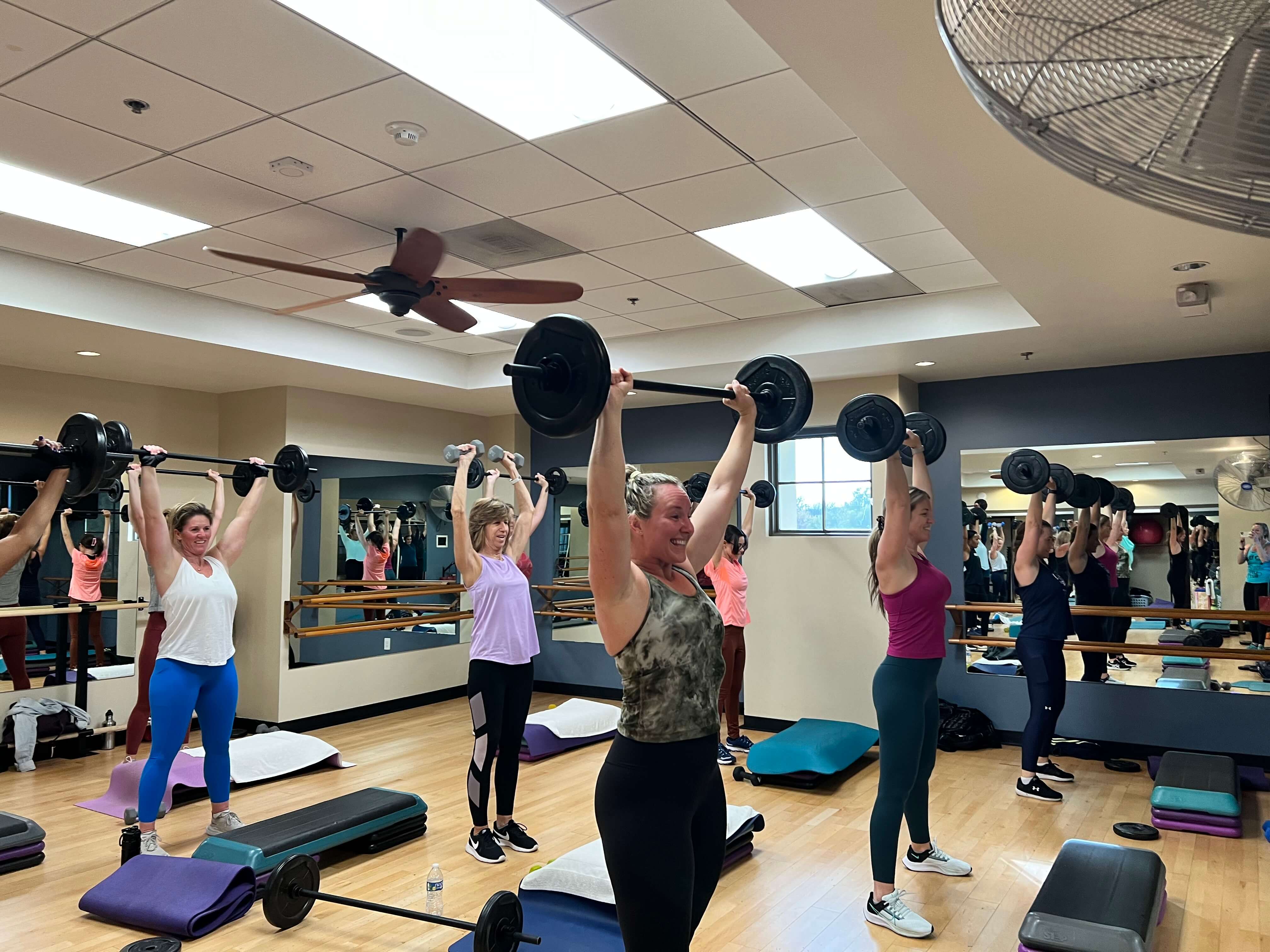7 Reasons you should join the Women’s Strength Training program at the Paseo Club
August 14th, 2024 | 5 min. read
By Jen Azevedo

Insomnia
Low libido
Mental fog
Depression
Headaches
Weight gain
Muscle and joint pain
When most people look at the list of symptoms above, they would imagine they were reading about a serious disease. Yet, these are just some of the signs all women in their late 30s through early 50s experience during perimenopause and menopause.
Perimenopause and menopause is a transition women go through as their hormones change and the fertile period of their lives comes to an end.
Characteristics of this phase affect women's cognitive, emotional, and physical well-being. Loss of muscle mass and bone density leave women more vulnerable to injury, broken bones, and pain.
The Paseo Club is a social club in the Santa Clarita Valley that has served the community for over twenty years. There are dozens of fitness and court programs for people of all ages and abilities.
In this article, you will learn about the issues menopausal women face, why strength training is essential for their health, and how you can sign up for the Women’s Strength Training small group program that is specifically geared toward 50+ women.
 Why develop a strength training program for 50+ women?
Why develop a strength training program for 50+ women?
Menopause can be a massive life transition. Women can experience difficult changes, like unexplained weight gain, hot flashes, poor sleep, or lack of energy. You may also find yourself dealing with nagging aches and pains, injuries, or increased soreness after your workouts. And those are just a few of the physical symptoms!
Menopause can also be mentally and emotionally challenging.
- You may experience mood swings, brain fog, anxiety, or depression.
- You may feel uncomfortable with how your body is changing, discovering extra weight in the midsection.
- You may feel a sense of grief and loss about how your body and life are different than they used to be.
- You may feel hopeless or frustrated that the nutrition and exercise strategies they used to use are no longer working the same way.
What does the research say about menopausal women and strength training?
Most women going through menopause experience significant age-related declines in muscle and bone mass. These conditions are called sarcopenia and osteopenia, and they can negatively impact women’s health and quality of life.
Sarcopenia is age-associated muscle loss. It affects simple functions like walking, standing up from the toilet, carrying something from one room to another, and getting up after you fall.
Osteopenia is age-associated bone loss that can eventually progress into osteoporosis, a condition that causes brittle bones to fracture more easily. It’s estimated that 40% of women will experience an osteoporotic fracture at some point post-menopause.
Hip fractures are a common type of fracture due to osteoporosis and are associated with a 15-20% increased mortality rate within one year after the break.
But there is good news! An intelligently designed strength-training program can help you slow — or even reverse — age-related bone and muscle loss.
 What is the Women's Strength Training program at the Paseo Club?
What is the Women's Strength Training program at the Paseo Club?
This is a progressive strength and conditioning plan for women going through perimenopause and menopause.
Progressive refers to the concept of each class being slightly more challenging than the one prior. The intent is to build your familiarity with strength training movements and increase your strength and endurance.
Why is this class designed to be progressive?
One of the most critical errors of many training programs is that they don’t emphasize progressions. Progressive training emphasizes intelligently and systematically changing the workouts over time to foster continuous advancement.
When your workouts don’t include progressions and the program doesn’t change over time, your body adapts, and progress eventually stops. In other words, you hit a plateau.
Progressive exercise programs are a cornerstone of effective fitness training, ensuring workouts remain challenging, safe, and aligned with individual goals. By implementing a systematic approach to progression, you can achieve sustainable results and maintain motivation over the long term.
 What types of movements can women expect to perform in this class?
What types of movements can women expect to perform in this class?
The exercises in these workouts are tailored to the unique needs of women in and beyond menopause.
There are two important features of this program to be aware of.
Compound Exercises
Most exercises in this program are compound movements, targeting multiple muscle groups at once. Examples include squats, deadlifts, and lat pulldowns.
Compound exercises help you get a lot of muscle stimuli without adding additional time to your session — or in other words, they help you get a lot of bang for your buck!
They’re also excellent for building full-body strength and muscle mass, meaning they can help you reduce (or even reverse) your risk of age-related muscle and bone loss.
High-Impact Exercises
High-impact exercises are a fantastic way to maintain and build bone tissue. The instructor will select a variation of the high-impact movements appropriate for all ability levels.
 7 Reasons to join Women’s Strength Training small group program
7 Reasons to join Women’s Strength Training small group program
There are several benefits to joining the Women’s Strength Training small group program at the Paseo Club.
1. Manage your weight
Strength training builds muscle mass. Muscle mass boosts your metabolism to burn fat during workouts and after — even while you sleep.
2. Improve cardiovascular health
Over 44% of women are living with some form of heart disease. Women who have early onset of menopause are more vulnerable. They have a 39% higher risk of heart failure than women who experience menopause at age 50 or older. 41% of postmenopausal women also have high blood pressure. Exercise, particularly weight training, is proven to lower blood pressure and improve cardiovascular health.
3. Build and maintain muscle mass
Muscle loss due to aging and hormonal changes is progressive. Dr. Humza Siddiqi of UT Southwestern Medical Center reports that strength training is not only beneficial for combatting sarcopenia, it is the “only activity proven to slow the progression of sarcopenia and reduce its effects.” This means once you are 40, you must strength train to slow muscle loss. There is no other option.
 4. Prevent falls and improve balance
4. Prevent falls and improve balance
As you age, the risk of falling increases. This is due to several reasons — bone and muscle loss, postural hypotension, reduced senses, and specific health issues, such as diabetes, heart disease, or problems with your thyroid, nerves, feet, or blood vessels. Strength training can give you more strength, stability, coordination, and balance.
5. Boost flexibility and maintain mobility
The primary focus of strength training programs is on developing skills, learning proper technique, and the workout. But warming up and cooling down through stretching and mobility is also essential to a good weightlifting class. This practice will keep you flexible and mobile.
6. Enhance bone density and prevent osteoporosis
According to research at Harvard, “Activities that put stress on bones can nudge bone-forming cells into action. That stress comes from the tugging and pushing on bones during strength training.”
7. Enjoy the camaraderie of other menopausal women
Menopause is often not discussed. Most women go into this period with little to no information about it. Becoming part of a community of women all experiencing the same challenges can help you feel a sense of support and belonging. Plus, working out with peers is proven to boost your commitment and accountability.
 When is the Women’s Strength Training Class, and how can members sign up?
When is the Women’s Strength Training Class, and how can members sign up?
Women’s Strength Training class meets Wednesdays at 6 pm and Saturdays at 11 am. You can sign up for one or both classes. This small group program is taught by Fitness Director Cezanne Youmazzo.
Feeling your best at 50 and beyond
Aging is an irreversible process that naturally affects your appearance, energy, and strength. But this is not the time to passively slide into a sedentary life. Your health and vitality are as important as ever. But it does require a different approach.
Join women in community and connection while supporting each other to work out and be your best self in your 50s and beyond. Learn to stretch, mobilize, and lift in this class custom-designed for you.
After class, give yourself some well-earned TLC by recovering in the sauna or steam room, taking a dip in the pool, or visiting with your new “swole-mates” over a meal or drink. There are dozens of ways to live a healthy, happy life at the Paseo Club.
If you are not yet a member of the Paseo Club, you can schedule a tour to check out all eight acres of the facility or simply sign up online. The process takes just minutes and you can jump into activities at the club the very same day. We look forward to seeing you soon!
Jen Azevedo is a tennis professional, pickleball professional, personal trainer, group exercise instructor, and the general manager of the Paseo Club. She loves the community at the Paseo Club and that it is also a safe and fun place for her daughter. Jen’s favorite activities are joining her tribe for trail races or her partners for tennis matches. Occasionally Jen slows down to relax with a book — she reads over 100 a year!

